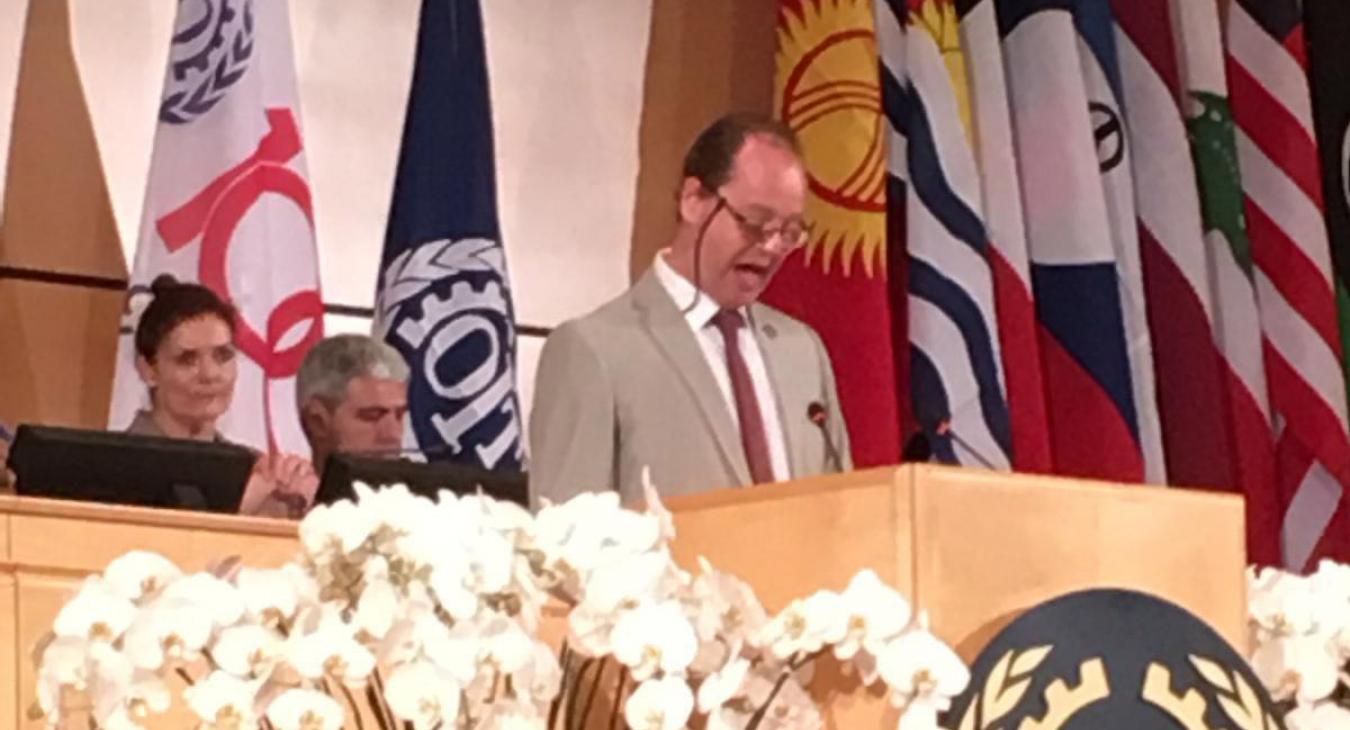It is a particular honour to address this centenary conference of the ILO on behalf of the Irish Congress of Trade Unions.
I welcome the report of the Director-General: Work for a better future – the landmark report by the ILO Global Commission on the Future of Work examining how to achieve a better future of work for all at a time of unprecedented change and exceptional challenges in the world of work.
It has built on the values and objectives of the Declaration of Philadelphia, which needs to be reinvigorated, renewed, and strengthened. In that regard, we welcome the plans of the Irish Government to hold a conference in September to mark the ILO centenary to reflect on how we might do just that in an Irish context.
The report has 10 recommendations on how to deliver a new social contract. Allow me to reflect on just a few of these:
- "A universal labour guarantee that protects fundamental workers" rights, an adequate living wage, limits on hours of work and safe and healthy workplaces":
A very welcome discussion on shorter hours and the need for more time sovereignty is essential for a reinvigorated social contract. Congress was pleased that the Employment (Miscellaneous Provisions) Act came into force earlier this year. It enhances worker's rights and protects low-paid vulnerable workers and in particular zero hours contracts have been prohibited "in most circumstances" and provides for greater certainty for workers on their conditions of employment and in particular their hours of work.
On collective bargaining, we will soon be publishing a set of proposals to improve collective bargaining rights for workers in Ireland. The rights to freedom of association and collective bargaining are under attack right around the world and we are taking this initiative to defend those rights and ensure that they are available in practice, not just on paper, for all workers.
We also welcome the ratification of the ILO Forced Labour Protocol earlier this year and that Ireland has now joined the "50 for Freedom campaign" by being among the first 50 countries to do so. We are of the view that there is much learning to be had from the UK Modern Slavery Act and urge the Irish Government to consider similar legislative moves in relation to mandatory due diligence. The recent case about the Atypical Migrant Workers Scheme for Non-European Economic Area Crew in the Fishing Fleet in relation to the widespread exploitation of migrant labour is an illustration of the need for such initiatives. We welcome the agreement with the authorities secured by the International Transport Workers" Federation (ITF) that will see the introduction of measures to protect migrant workers in the Irish fishing industry from trafficking and modern slavery.
- In relation to Guidance of people through transitions;
We have been working to ensure that the concept of a Just Transition is a fundamental part of climate action measures by both Government and companies seeking to reduce carbon emissions and are hopeful that the imminent Government action plan will include this concept.
- A transformative and measurable agenda for gender equality and ending violence at work.
The Gender Pay Gap Information Bill requiring companies to report their gender pay gaps and the introduction of paid Parental Leave will make an important contribution in this regard. We also note the recent decision by Government to establish a new Citizens' Assembly to examine and make recommendations on the issue of gender equality. There is much to be done to achieve true gender equality and that is also why we have also been working so hard with Employers and Governments in the Committee on Violence and Harassment to achieve a strong and effective Convention and Recommendation.
The need for an international instrument for digital platforms is another useful point. We also welcome reference to the role of Quality Public Services and the idea of a right to digitally disconnect.
Finally, I want to note the report on the situation of workers of the occupied Arab territories and the decent work deficits it outlines. The report outlines rising uncertainty in the West Bank, and collapse in Gaza, where only one in five people of working age were employed in 2018. The 12-year-old Israeli blockade has decimated Gaza's productive base and eroded employment opportunities.
It is of particular concern that there are some 18,400 children involved in child labour in the Occupied Territory and also that the practice of the detention, interrogation, or torture of Palestinian children living under Israeli military occupation in the West Bank continues. That is why unions in Ireland are planning a conference later this year for the 30th Anniversary of the UN Convention on the Rights of the Child.
Of significance also are two recent resolutions from both the ETUC and EPSU which recognise that European involvement in economic activities in these illegally occupied territories perpetuate the situation and go on to call for more effective sanctions against Israel until they comply with UN resolutions and international law.
We also continue to support the Occupied Territories Bill making its way through our Parliament.
Thank you President.

